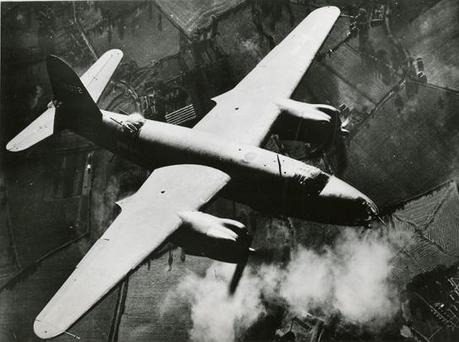
This is one of those rare war novels actually written and published during the war, bringing with it that crackling sense of tension that can only be created by the author’s ignorance of when – or if – the conflict will end, and how much worse it will get before it does. It is also unusual for me as I have never read a war novel that is set in occupied France, and focuses on a British pilot trying to escape to freedom with the help of a French family. I found this take on the experience of living during WWII both enlightening and thrilling, and I was absolutely engrossed from the first page.
As the novel opens, John Franklin is flying over France with his crew on a now-routine journey back to base in England. Franklin is on autopilot; he has survived years of flying amidst the skies of Europe where enemies swarm like flies, and has seen many a friend disappear in a ball of flames. He knows what it is to feel terror, but surviving this long has given him a sense of immortality; he cannot conceive the possibility of his own death, and has even begun to find many of his flights rather mundane in their repetitive nature of trundling back and forth over familiar territory. So, when his plane malfunctions and he is forced to bring it down in a French field, Franklin and his crew find themselves in a situation they have been well trained for, though have never had to face. With no idea where they are or what they might be walking into, and with Franklin nursing a severely injured arm, the group of pilots are forced to take their chances on a remote farmhouse. There they find a young girl, her father, grandmother and the family’s hired man, who, due to their own wartime experiences, are eager to help. However, with the Germans on the prowl and Franklin’s condition growing more serious by the day, the pilots know they can’t afford to stay put for long.
Much to Franklin’s distress, his crew mates are forced to leave without him, and the family take on great risk by keeping him and obtaining medical help from the local town. Meanwhile, Franklin has grown to love the beautiful and pure young French girl who has a frank and unwavering certainty about everything she does, and the thought of placing her in danger tortures him. As the days go on, the situation gets progressively worse. The Germans harden their grip on the local community, plunging everyone into a state of fear. Franklin knows he must go, but disabled and cast adrift in the middle of unfamiliar territory, how will he be able to find his way across the border and back to England alone?
This is where things get really exciting, and I won’t say what happens, because it would ruin the adventure of reading it. The ending is wonderfully gasp inducing and the evocation of a war-battered, exhausted France is haunting and powerful. I found this perspective on the experience of war utterly fascinating, and the bravery of the French citizens in risking everything to support their comrades was awe inspiring. So many ordinary people did so many extraordinary things, without record and without recognition, and reading Fair Stood the Wind for France has given me a real desire to find out more about the experiences of civilians who risked their lives to fight against the enemy’s most sinister weapon; fear and intimidation of the wider populace. H E Bates might not be the most eloquent writer in the world (as a fan of lexical variety, his tendency to repeat the same phrases did grate on me ever so slightly), but this is such a fantastic story full of genuine suspense that it really is a must-read for those wanting to experience what it was to be at war.
